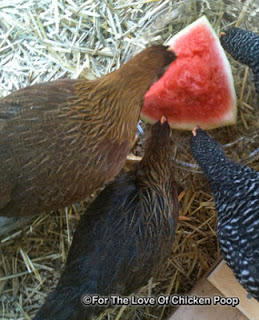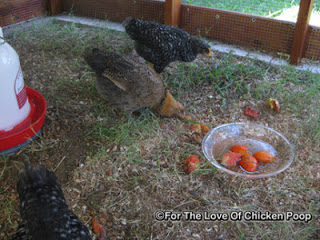 by Liz Hessen of For the Love of Chicken Poop
by Liz Hessen of For the Love of Chicken Poop
Looking back on our own chicken keeping adventures this topic is one that just can’t be stressed too much. If you are a newbie in the chick keeping world you should learn the signs of heat stress/exhaustion, how to prevent and treat it.
 |
| Watermelon is a great hydrator and they love it. |
It might seem like a far off notion to worry about heat stress while there is still snow on the ground in some areas but if your getting chicks for the first time try thinking beyond the cold weather and on to a warm sunny day and what to do and when. Preventing heat stress all together would be ideal.
 |
| Ice cubes, parsley and marigold petals floating in water. |
Please note: We can’t stress the importance of this enough!!! Keeping chicks and grown chickens hydrated, cool and comfortable is NOT PAMPERING or SPOILING them! For chicks it’s helping them get a good, healthy start in life. For grown, egg producing hens it’s helping them lay good healthy eggs without jeopardizing their own health. Know how to prevent heat exhaustion/stress! Know how to treat a chicken suffering from heat exhaustion!
 |
| Hmm, whats in this? |
Once the chicks get old enough to go outdoors for playtime (which will happen quickly) you need to watch them closely for signs of heat stress. We took ours on their first outdoor adventure at about two weeks. It was the middle of July and they started showing signs of heat stress within about 5 minutes. Even though I had been told about heat stress I was shocked at how fast they showed signs of it. Of course we took them back inside where it was cool and they had plenty of water available.
ALL chicks and grown chickens will normally pant, like dogs, to keep cool. Their panting is one of the first signs that they need water and shade. It doesn’t take long for ours to start panting when they days are only slightly warm. When they’re out free ranging or just playing they go at it with all they’ve got…like a little kid who doesn’t know when to stop.
Signs of heat-stress in CHICKS are panting and spreading their little wings also a little droopy acting. Showing any of these signs means they need to get back to where it’s cool and there is water!
In grown,egg producing CHICKENS signs of heat stress/exhaustion are panting, holding the wings out, a very pale comb and wattles, eyes closed, even lying down.
If you do have a chicken that seems to be suffering from heat exhaustion or dehydration, get her somewhere cool and soak her in a tub of cool water to bring her body temperature down. Give her cool water to drink and some plain Pedialyte or even Gatorade in a pinch for added nutrients to replacing electrolytes.
 |
| Beautiful eggs. |
An egg is mostly water and a chicken will give her all to lay that egg! In the heat, egg producing chickens will need their intake of fluids ramped up considerably to cover what is needed for egg production and to keep her hydrated and comfortable. You might see more soft-shelled eggs in times of high heat. Apple cider vinegar added to the water can help with calcium absorption. When it’s very hot they may not be interested in their feed…just like humans they want to find a shady place and kick back and chill! Make sure their laying feed is high quality! Adding a little Apple cider vinegar to their water just a few times a week can help to level their pH so their bodies can absorb more calcium for better eggs.
WAYS TO HELP YOUR CHICKS AND CHICKENS STAY COOL:
- Shade and fresh, clean water accessible to all your hens is first and foremost in importance. Nipple style watering systems are not recommended as their only water source. It’s possible for chickens higher in the pecking order to block the others from getting water. It’s important to have many water sources available, like watering tubes or open pans of water, especially in the summer! And if you don’t have trees and bushes already there to provide shade you can rig up some tarps or sheets to block the sun…but be sure they don’t block any breeze or airflow.
- Frozen treats are a great start towards keeping them hydrated. They will love pecking at watermelons, which are mostly water anyway, ice cubes filled with treats. Fresh grass that has been cut into shorter lengths can be floated in a bowl of water. I went to Dollar Tree Store and got plastic ice trays to use just for them. Ours really love treats frozen like this and it’s good to keep those fluids going in what ever form they will take. You can make these treats ahead of time and keep them in the freezer till needed.
- We have a hose with nozzle that can be set on mist. We move it around to different areas of the run and yard. When we set it near the run any breeze we get catches the mist and cools without over wetting things. Our humidity is already extremely high here and when we wet the ground or anything else too much and the wrong way it only causes MORE problems. For our situation, a hose nozzle set on mist is easier to control than a large misting system.
- A box fan or isolating fan set outside the coop helps a lot. Letting the fan blow across frozen water in gallon jugs will help cool the air. Try laying frozen jugs of water on the floor of the coop so the chickens could perch on or next to them.
- Keep a number of pans, large bowls, and buckets filled with clean cool clean water sitting in shaded areas for them. Some chickens will only drink the water but some breeds will climb in and stand to cool their feet off a bit. Julie, our brown leghorn loves standing in the big black rubber bowl we use…even if its filled with food.
- Home made electrolytes or plain Pedialyte or Gatorade added to their water in extreme heat can also help them cope better – one cup per gallon of water every few days.
- Never give scratch grains during the hot months – the act of digesting scratch actually warms up a chicken’s body.
- Different breeds of chickens will handle heat (and cold) differently. Our buff polish crested is always the first one to show heat stress – some of the others tolerate the heat a bit better.
Along with your first aid supplies for injuries or illnesses should also contain:
Pedialyte or Gatorade
Homemade electrolytes (*see recipe below)
Apple Cider Vinegar
Baking Soda
*Recipe for homemade electrolytes:
1 Cup Water
2 teaspoons sugar
1/8 teaspoon salt
1/8 teaspoon baking soda
Use full strength on severely ill chickens. Replacing the electrolytes lost during times of high stress and unbearable heat could mean the difference between life and death to your chickens. It can also be mixed into their drinking water every few days as needed. One cup homemade electrolytes per gallon of water.
 |
| Frozen tomatoes. |
Treat ideas for helping your chicks or chickens to stay hydrated:
– Watermelon (or other melons) cut in small chunks or just cut it in half – they love it.
– Freeze sliced or chopped tomatoes and then serve them on a flat plate or platter (if
your grow you own you probably have plenty to spare)!
– Grapes – cut up in small pieces if they’re for chicks.
– Cucumbers, sliced small.
– Blueberries, sliced if for chicks.
– Strawberries, sliced if for chicks.
– Ice cubes with herbs like parsley, basil, marigold petals, bits of fruit frozen in them.
– Lettuce chopped (for chicks), torn apart or left or whole floating in water.
– Fresh grass and other greens chopped up and floating in cold water.
– Some of their favorite treats can be frozen in ice cubes – get CREATIVE!
 |
| Fresh cut grass floating in water. |
Ours love fresh grass cut up and floating in cold water. I’m not sure what makes this different from eating grass while they are free ranging (perhaps because it’s prepared and served by their personal chef), who knows!
They may not completely eat what you freeze in the ice cubes but they will want to peck down find out what is in the middle – resulting in them getting more fluids as they do…sneaky!
Liz –












